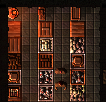Storage: Difference between revisions
No edit summary |
|||
| (2 intermediate revisions by the same user not shown) | |||
| Line 1: | Line 1: | ||
[[File:storage_preview.png|thumb|106px|Storage crates in a warehouse.]]'''Storage''' is | [[File:storage_preview.png|thumb|106px|Storage crates in a warehouse.]]'''Storage''' is a core game mechanic in ''[[Songs of Syx]]''. It is the process of storing a [[resource]] somewhere for convenience, and in the case of [[food]], to keep things from spoiling. Almost every [[building]] in the game can store things, but [[warehouse]]s are the most prominent and convenient building for this purpose. | ||
Warehouses allow the player to keep track of any resource inside them. Most buildings that exist for offering [[citizens]] some sort of service or meant for making a specific type of resource have storage crates for finished goods. Goods that aren't about to be used right away, will be taken to the nearest warehouse. Food that isn't stored in a warehouse will spoil much quicker. [[Hauler]]s also act as storage areas, but the purpose | Warehouses allow the player to keep track of any resource inside them. Most buildings that exist for offering [[citizens]] some sort of service or meant for making a specific type of resource have storage crates for finished goods. Goods that aren't about to be used right away, will be taken to the nearest warehouse. Food that isn't stored in a warehouse will spoil much quicker. [[Hauler]]s and [[transport]]s also act as storage areas, but the purpose is different, as they are meant for banking up resources at a marked location for constructing [[building]]s near them at a later time, reducing back-and-forth travel time when citizens are getting resources for construction. | ||
Haulers do not provide the benefits that warehouses do. When hovering over a resource in the resource GUI at the right of the screen, every area that the inspected resource is stored in will be shown: warehouses, [[export depot]]s and [[import depot]]s. Anything stored in [[army supply depot]]s will count as being in a warehouse. | Haulers do not provide the benefits that warehouses do. When hovering over a resource in the resource GUI at the right of the screen, every area that the inspected resource is stored in will be shown: warehouses, [[export depot]]s and [[import depot]]s. Anything stored in [[army supply depot]]s will count as being in a warehouse. | ||
| Line 9: | Line 9: | ||
Storage takes a large part of trading. Export depots and import depots must be built to store and collect resources to facilitate the trading. The player can choose what amounts of what resource to store in an export depot (in multiple of 128), but care must be taken in doing this, because storing too much in said depot can greatly diminish what the settlement can use. | Storage takes a large part of trading. Export depots and import depots must be built to store and collect resources to facilitate the trading. The player can choose what amounts of what resource to store in an export depot (in multiple of 128), but care must be taken in doing this, because storing too much in said depot can greatly diminish what the settlement can use. | ||
An import depot allows the player to request any resources they want, but will only receive it if they accumulate enough value based on the resources | An import depot allows the player to request any resources they want, but will only receive it if they accumulate enough value based on the amount of values of the resources traded away. | ||
[[Category:Gameplay elements]] | [[Category:Gameplay elements]] | ||
Latest revision as of 00:13, 19 November 2021

Storage is a core game mechanic in Songs of Syx. It is the process of storing a resource somewhere for convenience, and in the case of food, to keep things from spoiling. Almost every building in the game can store things, but warehouses are the most prominent and convenient building for this purpose.
Warehouses allow the player to keep track of any resource inside them. Most buildings that exist for offering citizens some sort of service or meant for making a specific type of resource have storage crates for finished goods. Goods that aren't about to be used right away, will be taken to the nearest warehouse. Food that isn't stored in a warehouse will spoil much quicker. Haulers and transports also act as storage areas, but the purpose is different, as they are meant for banking up resources at a marked location for constructing buildings near them at a later time, reducing back-and-forth travel time when citizens are getting resources for construction.
Haulers do not provide the benefits that warehouses do. When hovering over a resource in the resource GUI at the right of the screen, every area that the inspected resource is stored in will be shown: warehouses, export depots and import depots. Anything stored in army supply depots will count as being in a warehouse.
Trading
- Main article: Trading
Storage takes a large part of trading. Export depots and import depots must be built to store and collect resources to facilitate the trading. The player can choose what amounts of what resource to store in an export depot (in multiple of 128), but care must be taken in doing this, because storing too much in said depot can greatly diminish what the settlement can use.
An import depot allows the player to request any resources they want, but will only receive it if they accumulate enough value based on the amount of values of the resources traded away.